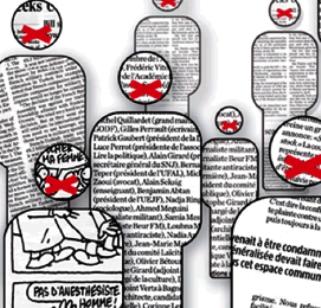words by Pierangela Zandanel
The year 2011 has been a bleak year for press freedom and the work of journalists in the 179 countries around the world, according to the latest report by Reporters Without Borders, which monitors the situation of press freedom in various countries worldwide.
The report indicate that, in the last decade, the situation has worsened especially in large democracies like the United States, 20th in 2010 and now fallen in the rankings to 47th.
In 2007 Italy was 35th, 44th in the following year, 49th in 2009 and 2010 and plunged to 61st place this year, just behind Guyana and other two countries certainly not famous for the freedom enjoyed by journalists, like the Central African Republic and Lesotho.
Among the reasons given by Reporters Without Borders, there are the many attempts by the Berlusconi’s government to introduce gag laws and Internet filters: "Italy (61st), in which about a dozen journalists is still under police protection, with the resignation of Silvio Berlusconi has just turned the corner after several years of conflict of interests. But the positioning of this year still has his brand, particularly through the attempts to introduce a bill approving gag laws and filters to the Internet without consulting the Justice, fortunately both rejected. Italy is also among the countries that fail to address the problem of violations of their freedom press due to a lack of political will".
It is certainly hard to reach countries like Scandinavia that are ranked high in the list for the autonomy of the information, but at least we could try to avoid the approval of certain amendments that would limit further the freedom of information, as the amendment proposed by Mr Fava .
Amendment Fava
On 19 January Mr Giovanni Fava - Lega Nord party - has tabled an amendment to the Community law of 2011 that is even worse than the U.S. SOPA law and states that "anyone can call for censorship about illegal contents with no need to involve the judiciary".
According to this amendement "anybody can ask a hosting service provider to remove any content published online by a user based on mere suspicion, not proven by any judicial or administrative authority, be it a content that violates their rights and that, if the provider does not comply with the request, can be held responsible".
In this way, anyone can request removal of content that in their opinion violates copyright law. In this case the provider is faced with a choice: accommodate the request, or take responsibility for the content. This is worse than SOPA where the order of removal of a posting is issued by a judicial authority.
The FAVA law is a form of justice privatization, the removal depends on individual judgment and not approved by an impartial judge. A real threat to freedom of expression on the web for what concerns Italy.
After all this are we sure we are living in Italy or not instead in the People's Republic of Italy?









